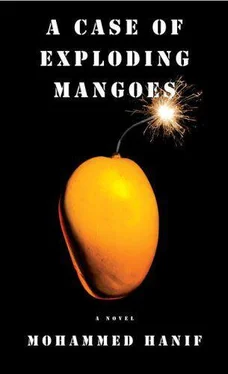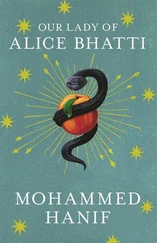The marines at the guardhouse could afford to party while on active duty not because it was the Fourth of July but because the security for the premises was being managed by a contingent of the Pakistan Army. Five hundred metres before the guardhouse, on the tree-lined road that led to the ambassador’s residence, the guests were required to stop at a makeshift barrier set up by Brigade 101. The troops, under the watchful command of a subedar major, greeted the guests with their bomb scanners and metal detectors. They slipped their scanners under the cars, asked their non-white guests to open the boots of their cars and finally waved them towards the guardhouse where an increasingly cheerful group of marines welcomed them. The army contingent had set up their own searchlights to illuminate the road. Here, too, the trees were awash with light so intense that the birds’ nests on the trees lining the road lay abandoned. A catering van sent by the district administration delivered their dinner early and the Subedar Major was livid when he discovered that the samovar which came in the van was empty. “How are my men going to stay awake without tea?” he shouted at the civilian van driver, who shrugged and drove off without replying.
Embassy functions were usually select affairs, but watching the guests arrive from the guardhouse, Corparal Lessard thought that the ambassador seemed to have invited everyone who had ever put a bandage on an injured Afghan mujahid and every Afghan commander who had taken a potshot at a Russian soldier. Corporal Lessard relieved the professor of his duty when he saw the first guest in a suit, a lanky man with a flowing beard. “OBL,” the bearded man said, and raised his hand as if he wasn’t identifying himself to a party usher, but greeting an invisible crowd.
Corporal Lessard went through the list and looked at the man again.
“Of Laden and Co. Constructions.” The man patted his beard impatiently and Corporal Lessard ushered him in with a smile and an exaggerated wave of his hand. Taking his turn at the beer pot, Corporal Lessard told a joke. “What does a towelhead wear to disguise himself?” Then choking on his own beer, he blurted: “A suit.”
The ambassador had reasons to be inclusive. A year into his job, Arnold Raphel was feeling increasingly isolated as dozens of American agencies ran their own little jihads against the Soviets along the Pakistan-Afghanistan border. There were those avenging Vietnam and there were those doing God’s work and then there were charities with names so obscure and missions so far-fetched that he had a hard time keeping track of them. Now that the last Soviet soldiers were about to leave Afghanistan and the mujahideen were laying siege to Kabul, some Americans were tearing at each other’s throats to claim credit, others were just lingering, reluctant to go home, hoping for another front to open. Just last week he had received a demarche about a group of teachers from the University of Minnesota who were writing the new Islamic books for Afghanistan and sending them to Central Asia. He investigated and was told to keep his hands off as it was yet another branch of yet another covert programme. Every American he met in Islamabad claimed to be from ‘the other agency’.
He was certain that if he wanted to bring this chaos under control, he first needed to bring them all under one roof and make a symbolic gesture so it became clear that there was one boss and it was him. And what better way to do it than throw a party? What better time to do it than the Fourth of July? He was hoping that this would be a farewell party where American nuts would be able to meet the Afghan commanders who had done the actual fighting, get their pictures taken, and then everybody would go home so that he could get on with the delicate business of implementing US foreign policy. Arnie had not prepared a speech but he had a few lines ready that he would weave into the big conversation that he wanted to have with his American guests: ‘ victory is a bigger challenge than defeat’, ‘answered prayers can be more troublesome than the sad echoes of unanswered prayers ’.
He wanted it to be a ‘job well done, now push off to wherever you came from’ kind of party.
Standing with the ambassador and feeling disgusted at the sight of respectable men gnawing at bones was General Akhtar. He also felt out of place and overdressed. He had turned up in his full ceremonial uniform, with gold braid and shiny brass medals, and now he found himself surrounded by small groups of white men dressed in loose shalwar qameez and the most astonishing variety of headgear he had seen since his last visit to Peshawar’s Storytellers’ Bazaar. General Akhtar knew before everyone else that General Zia would not turn up for the party. “He is not feeling too well, you know,” he told Arnold Raphel, looking closely for any reaction. “Brigadier TM’s loss is a big setback. He was like a son to General Zia. One of my best officers.” When Arnold Raphel offered indifferent condolences, it only strengthened General Akhtar’s resolve to square things with the Americans one last time. He had won them their war against communism. Now he wanted his share of the spoils. He picked up a strawberry from the shortcake on his plate and said to Arnold Raphel, “Mrs Raphel has done a splendid job with the arrangements. Behind every great man…”
OBL found himself talking to a journalist who was nursing a beer in a paper cup and wondering what he should file for his newspaper now that General Zia hadn’t turned up. “I am OBL,” he told the journalist and waited for any signs of recognition. The journalist, a veteran of diplomatic parties and used to meeting obscure government functionaries from far-flung countries with bizarre motives, pulled out his notepad and said, “So what’s the story?”
Out in the guardhouse, the University of Nebraska professor, now fully accepted as an honorary marine for the evening, raised his bottle and proposed a toast to the warrior spirit of the Afghans, then paused for a minute.
“What about our Pakistani hosts?”
“What about them?” Corporal Lessard asked.
“The guys on the trucks out there. Our first line of defence. What are they doing?”
“They are doing their duty. Just like us.”
“No, they are doing our duty,” the professor said. “They are keeping the enemy at bay. They are guarding us while we enjoy this feast, this feast to celebrate our freedom. We must share our bounty with them.”
Corporal Lessard looked around the already crammed guardhouse. “There are about two hundred of them. They wouldn’t fit in.”
“Then we must take our bounty to them.”
Corporal Lessard, drunk on Coors and patriotism and the love that one feels for one’s fellow human beings on days like this, volunteered to take a tray of food to the Pakistani troops. He thought of throwing in a couple of beers but he had been taught in his cultural sensitivity course not to offer alcohol to the locals unless you had an ulterior motive or the locals absolutely insisted. Corporal Lessard covered a stainless-steel tray with aluminium foil, hoisted it over his head and started walking towards the Pakistani troops. He walked in the middle of the road. The tree branches on both sides of the road hissed like snakes in his drunken vision. The road seemed endless.
OBL and the journalist found each other equally dull. The journalist listened with a smirk on his face when OBL claimed that his bulldozers and concrete mixers had been instrumental in defeating the Soviets in Afghanistan. “My editor thinks that it’s his pen that forced the Red Army to withdraw, and he can’t even compose a sentence,” the journalist said with a straight face. OBL gave up on the journalist when he offered to pose for a photograph and the journalist said, “I don’t have a camera and even if I did I wouldn’t be allowed to carry it into a diplomatic party.”
Читать дальше












